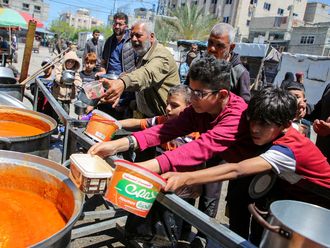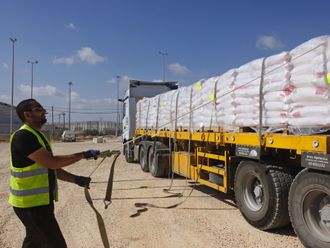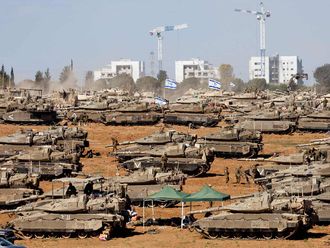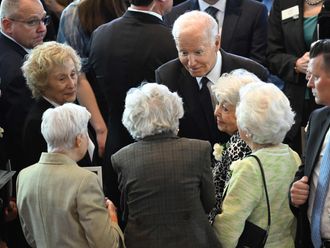Dubai: Palestinian refugees are not just another statistic, said keynote speakers at the Dubai International Humanitarian Aid and Development Conference and Exhibition (DIHAD) in Dubai.
The dignity and rights of Palestinian refugees has been brought to the forefront, as aid and services are no longer considered enough.
“They should not be represented as numbers, they are not statistics, they are people with hopes and aspirations in life like everyone else and should not only be looked at as mere recipients of aid,” said Pierre Kraehenbuhl, Commissioner General, UN Relief and Works Agency for Palestine Refugees in the Near East (UNRWA).
He pointed out that there is a need that goes beyond investing in general education and primary health care for refugees, which is the investment in human capital, self-reliance and development.
“The struggle for dignity starts with education and rights.”
There are over 5 million Palestinian refugees across the region and 1.7 people in Gaza, of which over a million are refugees. “Sixty-five per cent of the refugees in Gaza are under the age of 25,” said Kraehenbuhl.
Determination
He pointed out that all Palestinian refugees are focused on pursuing education on all levels and forging a strong labour force, and are in need of job opportunities. “I was struck by the fact that we have many developing and middle income countries that would envy Palestinian refugees for cultivating a high level of human income — the one thing Palestinians would envy everyone for is having a state,” he said.
Another keynote speaker at the conference, Christos Stylianides, European Commissioner for Humanitarian Aid and Crisis Management, also pointed out the need to build links between humanitarian aid and development aid. “Humanitarian aid has been the primary response to emergency but cannot offer a long sustainable solution in a long-lasting crisis, which is in need of a long-term approach.” He added that the lack of links has resulted in dependency on humanitarian aid.
Highlighting the conflict currently sweeping the region, Stylianides said there are an increasing number of incidents that violate the humanitarian law. The delivery of humanitarian assistance is being blocked, and aid workers have become targets in a systematic way. Out of 300,000 UNRWA aid works in the near East, 14 were killed in Syria, and 25 were detained or are still missing.
“The international humanitarian community rejects cultural wars and promotes dialogue,” said Stylianides. He called on the international humanitarian community to work together and show more tangible solidarity to design a comprehensive and innovative approach to each specific emergency by taking into account all dimensions; political, humanitarian, security, and development.
Join forces
The number of internationally displaced people is increasing, and the burden on hosting countries is unsustainable. “The result of this reality is that the needs are rising constantly, and our resources to meet these needs remain lenient. We are struggling.”
Stylianides said the way to respond to the growing needs is to invest in partnerships that will bring together all actors on the humanitarian landscape, which include donors, charities, foundation, and the private sector — including the UAE. Through partnerships they can address the need to reconsider and adjust traditional models of operation to reach out beyond borders. “Humanity is watching us all and we must deliver,” said Stylianides.












